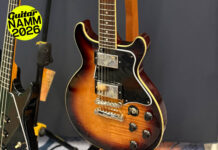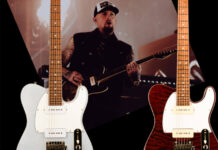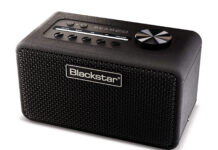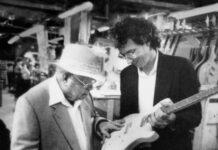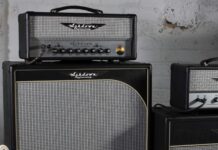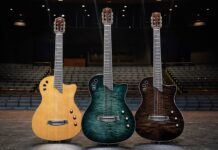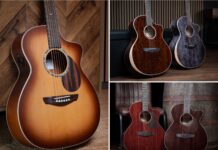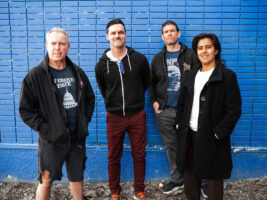
The five guitar albums that could save the world, as chosen by Propagandhi
Countless have called Propagandhi a punk band during their 39-year career, but the Canadians’ first mission statement upon forming was to tear the genre down.
READ MORE: “From the start we weren’t scared to switch up” Lee Malia on how Bring Me The Horizon became metal’s most ambitious band
“We were really critical of the punk scene,” singer/guitarist Chris Hannah tells me on a video call from his Manitoba home. “There were a lot of things we didn’t like about high school and society – hierarchical structures, social status – that we saw reflected in the local underground. We were like, ‘What the fuck?! I thought the whole idea was to get away from that!’”
Plenty has changed since 1986. Hannah and drummer/fellow co-founder Jord Samolesky now have their ranks rounded out by Todd Kowalski (bass) and Sulynn Hago (guitars). They’re eight albums deep into their career and have toured all over the world. One thing remains the same, however: Propagandhi are still proud outsiders.
“I still regard the music scene the same way,” Hannah continues, many of his sentences preceded by long, careful pauses for thought. “I feel very disconnected from any music scene anyone’s ever suggested we’re part of.”
Image: Dwayne Larson
In protest against pigeonholing, the band have tried their hand at skate punk, hardcore, metal, grindcore and more, frequently touching more than one subgenre at a time. Their new album, At Peace, stamps another flag into the singular territory they’ve cordoned for themselves. Hannah – whose first true musical love wasn’t punk, but the extreme metal of such mavericks as Death, Sepultura and Celtic Frost – likens its 13 songs to a cross between UK legends Judas Priest and Canadian hardcore underdogs SNFU. “Their riffs and lyrics were floating around me,” he explains, “and I would try to sense their presence and combine the two.”
Opening song Guiding Lights kicks off with a marching riff that wouldn’t have been out of place on Metallica’s landmark ‘Black Album’. The title track is a hardcore/thrash metal scurry – threaded with fast-paced, technical riffs – whereas God of Avarice, No Longer Young and single Rented P.A. serve up lashings of delectable alt-metal melody. None of these dalliances will be new to longtime fans, but the ratio of top-shelf songs makes At Peace more than worthy of the eight-year wait.
For all that sonic variety, the album’s lyrics are consistently as perplexed at the state of the world as they are sarcastic. On the single Cat Guy, Hannah offers an ethical conundrum: if a newborn Adolf Hitler and your family dog were both drowning and you could only save one, which would you pick? He eventually concludes that the only way for the question to not drive you mad is to dissociate from it. “Always been a cat guy anyways,” he shrugs.
It’s a neat summary of the 53-year-old’s worldview. As concerned as he is with current crises – animal cruelty, fascism becoming increasingly mainstream in the West, the atrocities in Gaza – being consumed by them when you’re ultimately powerless doesn’t help anyone. “I would love to bury my head in the sand, honestly,” he admits. “What fucking good does [paying attention] do? Would it be better if I just became a full-blown alcoholic and sat there watching hockey all the time? It seems appealing, but I can’t help it. I can’t help but just point and say, ‘This is total bullshit.’”
Image: Dwayne Larson
One issue Hannah can’t avoid feeling involved with is Donald Trump’s stated desire to make Canada the 51st American state (the frontman says it’s “galvanised” even the least political people around him). However, At Peace was written and recorded before the sitting US president’s re-election in November.
“If Trump had not won that election, and we were enduring another four years of a Democrat administration in the States presiding over a live-streamed genocide, it would still be the same record,” he says. “Maybe it wouldn’t stand out as much. With this ridiculous, cartoonish Trump administration, it stands out a little more.”
Hannah isn’t just aware of the world’s bullshit, though – he’s also an aficionado on the music that protests against it. So, for the second half of our conversation, we talk about the albums that he thinks could change things for the better, provided listeners take the morals that they express to heart.
Black Sabbath – Paranoid (1970)
“[Opening song] War Pigs is one of the best examples of economy in lyric-writing: it tells you exactly the truth about something in this world. Even if that song were made today, I’d be like, ‘Holy fuck. That’s just great.’ It’s so simple and direct but it captures it all. But, think of when it came out. In the 80s, I went through this whole political punk thing: I stopped listening to bands like Sabbath and immersed myself in DIY, political hardcore and punk. For all its nattering and liner notes and grand statements about the world, Ozzy Osbourne already said it 15 years previously!
“Musically, Paranoid is such a crazy record. It has Planet Caravan! I just find it so unique, even to this day. I’m somewhat embarrassed that I shunted it aside like this old and dusty thing from the past for so many years. I just want to celebrate it now for what it was that whole time: a genre- and culture-changing record.”
MDC – Millions of Dead Cops (1982)
“The first time I heard it at 14 or 15, I was looking at the song titles, like John Wayne Was a Nazi. I grew up on military bases [Hannah’s father was a fighter pilot–Ed.] and had this very insular view about how things work, and I was like, ‘What the fuck are you talking about? John Wayne was a war hero!’ He wasn’t, but in my mind…
“I was fascinated and conducted my own thought experiment: let’s go downtown, have a look around and hold my current worldview up against MDC’s. It was like, ‘Oh, yeah, my worldview is bullshit compared to what’s actually happening!’ What they were singing about was reality. It’s a pretty apocalyptic record, talking about gender dysphoria in a society of bigots and experiences in the mental health system. I lived in a bubble as a child, so I didn’t see a lot of those things. It was like that famous scene in The Matrix where he’s offered the blue pill or the red pill.”
Bad Brains – I Against I (1986)
“I’d never heard anything like it before. When I first heard it, I was like, ‘What is going on here?! How are they melding reggae with these metallic riffs and this punk stuff, and what’s this guy singing?’ I was fascinated, to the point where I had to keep listening to it.
“I Against I was game-changing because it ignored the established rules for what a hardcore band was supposed to sound like in a big, big way. And it wasn’t insignificant that it was four Black guys, instead of another bunch of white guys, and the way they saw the world. In its own cryptic way, it talks about white supremacy and the police state, of the African-American experience with the police. It just oozed authenticity to me: it seemed very real. It said you could do whatever, you don’t have to stick to the rules, and if that creeps into culture, that makes music better.”
Steve Earle – El Corazón (1997)
“Steve Earle’s catalogue, even when it’s not great, is very authentic. Those late 90s, early 2000s records, they’re basically live records. There’s something attractive about him putting out records that had flaws in them. The way he approaches music reminds me of DIY pop at its best: throw up the mics, run through the song, that’s the record. It’s inspiring, in a way.
“In general, Steve Earle is not your typical American. He’s someone who’s been very critical of prevailing orders, Democrat or Republican. That’s the way I also see the world, so it’s interesting for me to see it from an American Southerner: there’s something that connects us, despite the stereotypes that we have in Canada about white, American Southerners. Also, from a guitar-playing perspective… I guess he records in Nashville, where reputedly the best musicians in the world gather to make these records. I find them so musically beautiful.”
The Rebel Spell – Four Songs About Freedom (2007)
“The Rebel Spell were a Canadian band. Their singer, Todd Jenkins, died a few years ago in a climbing incident. They didn’t have the commercial popularity that we did, but I looked up to them because of Todd and the way he expressed himself. The guitar player, Erin [McGillicuddy], she has a Gibson Les Paul Junior and I loved her tone. I was always emailing her, asking, ‘What did you play on this record?!’
“Todd’s lyrics projected vulnerability but also confidence. The lyric that stands out to me is, ‘I can help you up. I got power to spare.’ The fucking guy… not defeated. He doesn’t just have power for himself to stand up, he’s got power to spare. I always thought that was fucking awesome! But, at the same time, there was lots of vulnerability. Again, it was the sense of authenticity that I found inspiring. I looked up to them in that sense.”
At Peace is out now via Epitaph.
The post The five guitar albums that could save the world, as chosen by Propagandhi appeared first on Guitar.com | All Things Guitar.
Source: www.guitar-bass.net

